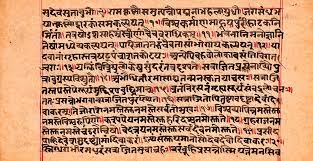The Puranas are an important part of the sacred literature of Hinduism. The Puranas are believed to have been written sometime between 1000 BCE to 500 CE, although these assessments vary. They are also primarily attributed to Maharishi Veda Vyasa, who also wrote the Mahabharata.
The Puranas elaborate some of the more abstract concepts propounded in the Vedas. They cover various topics like the origin of the universe, genealogy of many key figures including those worshipped as Gods, descriptions of certain rituals and practices, and stories around historic Hindu characters. The Puranas provide a more practical explanation of the theology of Hinduism and are often seen to be complementary to the Vedas.
The Mahabharata states that their are eighteen Puranas and these are also sometimes called the Mahapuranas or the Greater Puranas. The different Puranas are oriented to different temperaments and are therefore a guide for spiritual progress of a person, aligned to their individual nature.
The Puranas are sometimes classified on the basis of the primary deity (Brahma, Vishnu, Shiva, Surya, Agni) used in the explanations. Each Purana varies in size from 9000 verses to 80000 verses. The stories in the Puranas also often complement the stories in the Ramayana and Mahabharata.
